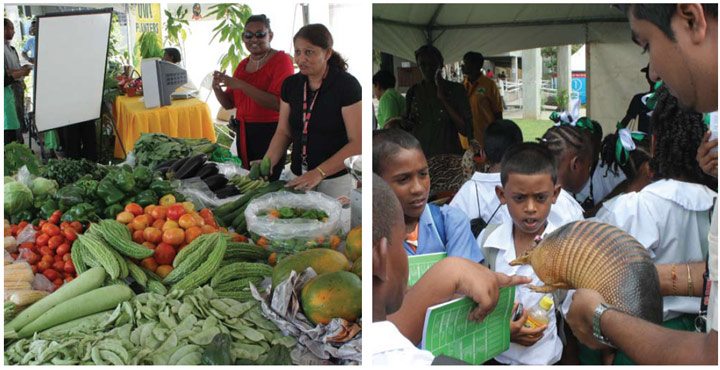 |
 |
 |
|
December 2010
|
Time to put food on the tableThe University of the West Indies celebrated World Food Day 2010 with a Food Fest and a Candlelight Vigil on November 12 and 13. At the opening ceremony, the Campus Principal, Prof Clement Sankat welcomed participants. This is an excerpt of his remarks. As many of you know, the UWI St. Augustine Campus celebrated its 50th anniversary last month. Our Campus was born out of the merger of the Imperial College of Tropical Agriculture and the University College of the West Indies in 1960. The Faculty of Agriculture was the founding Faculty on our Campus, followed by the Faculty of Engineering. So agriculture is a subject area that has been at the core of our university teaching, research and scholarship from the very beginning. One may argue that its importance and relevance to national and regional development is even more central today than it was fifty years ago, given the challenges we face as small island developing states with regard to food production, food security and our high food import bill, natural disasters, competition for agricultural and farming land, disease and pest control, poor rural infrastructure, an ageing community of farmers and the lack of interest shown by younger generations in the study and practice of agriculture and rearing of livestock. As a scholar and researcher myself, who is passionate about agriculture and especially food and agricultural engineering, I am deeply concerned by these developments. I have said on previous occasions that I feel that just over ten years ago, we gave up on sugar, bananas and other estate crops without thinking about the impacts on our countries, our communities and the livelihoods of thousands of families, without thinking through what to do next and putting in place a viable framework for sustainable agricultural development and food security. But there is nothing to be gained by lamenting the past. What we need to do is to continue to aggressively pursue viable options for agricultural development if we are to reduce our food import bill, contain inflation in food prices and put our society on a clear path towards enhanced food security for future generations. But the benefits are so much larger – the stability and viability of our rural communities and the improvement of the lives of our people and giving them a sense of hope for the future. We are at an exciting juncture in our development where our policy makers are speaking about diversification of the economy. This is therefore a time to put food and agriculture at the forefront. The UWI St. Augustine Campus is committed to doing our part by providing a supportive learning environment for agricultural studies and research. We recently appointed a new Director for the School of Agriculture, Dr. Chelston Brathwaite, whom I expect will bring his vast expertise and experience to bear on structuring and equipping our school so that it can deliver on its promise to the agricultural sector and in particular, to reinvigorate the programmes, research, development, technology transfer and service coming out of the School of Agriculture: our Cocoa Research Unit, our University Field Station, and our research in areas such as hot peppers, improved cocoa varieties, legumes and root crops, breadfruit and other tree crops, ornamentals, wildlife and small ruminant production (including rabbits, sheep and goats, etc.). The list is much longer! This is where the university has been making and can make an even greater contribution especially with the support of the government, international institutions, the private sector, civil society organisations, and especially our farmers. We hope to be able to achieve even more. Such collaborations and partnerships provide a greater multiplier effect for our efforts and resources and are the real manifestations of the theme “united against hunger” as we collectively work to fight hunger, malnutrition and poverty. None of us can do this alone. It is only through partnerships that the value of research and its application is realised and creative work can be seen to improve the lives of people. Let us not forget whom we are here to serve – improving the livelihoods of our farmers and processers, etc. must be a top priority. Let us examine their needs and work with them towards solutions. This is the most effective way for technology transfer. I would like to extend heartfelt congratulations to the Dean of the Faculty of Science and Agriculture, Professor Dyer Narinesingh, and his team for their dedication and commitment to the success of this event. I would like to thank the Minister of Food Production, Land and Marine Affairs and officials of the Ministry for also sharing this vision of a partnership with The UWI and other stakeholders for progress in food and agriculture. I am also thankful to the United Nations Development Programme, the Food and Agricultural Organization and other organisations represented here today for their support of the work of The UWI St. Augustine Campus. I firmly believe that through our research, innovation and partnerships, each of us will help to shape policy and influence decision making for more sustainable agricultural development and the wellbeing of the people of Trinidad and Tobago and the region. Hundreds attended the Food Fest at the JFK Quadrangle in November. |

